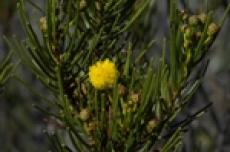We now have FOUR Threatened (Declared Rare) Flora
on Helena and Aurora Range, Bungalbin
Lepidosperma bungalbin and Acacia shapelleae
have been added to the
Threatened Flora list for WA
This is in addition to the two rare (Threatened) flora already listed on Helena and Aurora Range, Tetratheca aphylla subsp. aphylla and Leucopogon spectablis.
The addition of these two plant species as Threatened is good news. It recognises the vulnerability of all four of these species, being endemic to the main range of Helena and Aurora. The high conservation status allocated to these four plant species indicates that they need protection.
Lepidosperma bungalbin is a sword sedge that grows on the top of the range amongst the exposed rocks on the surface (Banded Ironstone Formation, BIF rock). Its leaves are flat and light green, and can be shiny on the surface reflecting the light from the sun or can be a glowing yellow-green when the sun shines through the leaves. Photo: Shapelle McNee

Acaia shapelleae, is a tall acacia shrub from 2 - 4 m high with yellow globular (round) flower heads and shiny, sticky, terete leaves. Photo: Geoff Cockerton
The four plant species now listed as Threatened (T) on the Range, under the Biodiversity Conservation Act 2016, are four of the five endemic flora known on Helena and Aurora Range, Bungalbin. The four that are listed as Threatened only occur on the main range (no where else in Australia or the world).
We don't know of any other Banded Irostone Formation (BIF) range with four species listed as Threatened.
Note: The fifth endemic plant species on the Range is Acacia adinophylla, which occurs both on the main range and the small hills that head out to the north west (J5 to J4) and some lower BIF ridge sites nearby.








